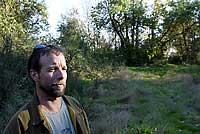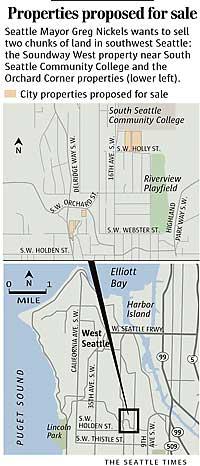Foes fighting mayor's plan to sell land

Earlier this year Mayor Greg Nickels said Seattle was "at risk of becoming the city formerly known as emerald" if it didn't do more to save its trees.
But now Nickels wants to sell seven leafy acres of open space in southwest Seattle to a housing developer and earmark the proceeds for four facilities: the Wing Luke Asian Museum, the African American Museum, a new Asian Counseling and Referral Services building, and a proposed South Downtown Hygiene and Homeless Services Center.
Neighborhood activists, environmental groups and some City Council members oppose the sale of the property known as Soundway West.
Mindful of Mark Twain's advice to "buy land, they aren't making more of it," they say the advantages of conserving the Soundway West parcel outweigh the short-term benefits of selling it.
"It's unusual to have such large open spaces, and I hate to be chipping away at them. It will never get more affordable to buy them," Councilman Tom Rasmussen said.
The Seattle Audubon Society notes that the parcel is lush with flora and fauna, including 29 plant species. The Nature Consortium contends that the property is crucial to the health of the adjacent West Duwamish Greenbelt. Nearby residents such as Matt Houghton are concerned that development would change the neighborhood's character and increase traffic.
But the mayor's staff and some council members see it differently. Deputy Mayor Tim Ceis argues that the proposal strikes a balance on open space because it would preserve 13 acres, called Soundway East, that's adjacent to the site targeted for sale. That would satisfy the mayor's call to save trees, Ceis said.
The proposed Soundway West sale would also help provide more housing in an area that needs it and generate more property-tax revenue for the city, he said.
"In three different ways we're meeting city objectives," Ceis said.
Council President Jan Drago noted it can be expensive to maintain open space, particularly as a public park. "What the mayor has proposed seems reasonable because they're maintaining a lot of green space and not suggesting a lot of development," she said.
In all, the mayor's proposal calls for selling the Soundway West property, another four acres in southwest Seattle called Orchard Corner, and 13 smaller properties scattered around the city from the Maple Leaf to Columbia City neighborhoods.
To date, only the Soundway West sale has generated opposition.
Together, the sales are expected to bring $4 million to the city treasury. Proceeds would support the following projects:
• $1.3 million for a new homeless facility.
• $1 million for redeveloping the East Kong Yick building into a new home for the Wing Luke Asian Museum.
• $1 million for rehabilitating the former Colman School to house a new African American Museum, affordable rental housing and office space.
• $619,000 for constructing a facility for the Asian Counseling and Referral Service.
The mayor has selected those projects because of their cultural, educational and social benefits, Ceis said. The city has no other options for financing those projects because it faces a $25 million gap next year between anticipated revenue and the cost of maintaining existing services.
The sale proceeds would be a one-time windfall, Ceis added, so that precludes using the $4 million for continuing costs such as hiring more police officers.
The council has to make a decision on the Soundway West proposal by Dec. 1, when it must finish writing next year's budget.
Council members acknowledge that Nickels has put them in a tough spot. "We're faced with competing really important needs," said Rasmussen, who wants the city to look for other parcels to sell instead of Soundway West.
Council members Richard Conlin and Jean Godden say they would like to postpone a sale to developers and give nonprofit conservation groups time to raise money to preserve Soundway West as open space.
Ceis said he does not object to giving conservation groups a shot at buying the land. "As long as we receive the value we need, I don't see that as any different than working with a private developer," he said.
Bob Young: 206-464-2174 or byoung@seattletimes.com
